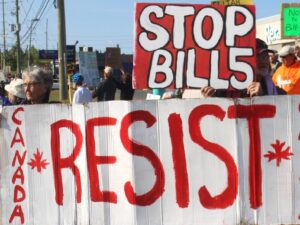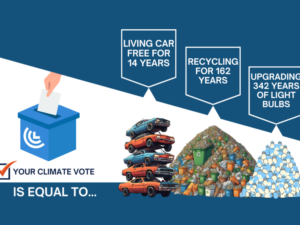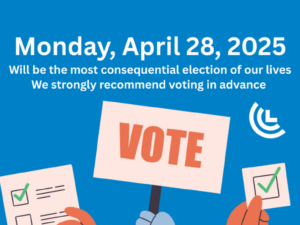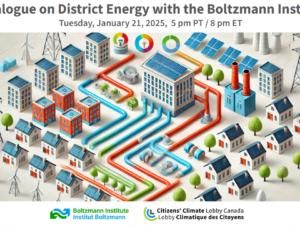Sudbury ON: Citizens’ Climate Lobby (CCL) is conducting a survey of the climate change-related election platforms of the four major political parties in Ontario prior to the provincial election anticipated in June 2018. The data the parties share with us will be published online on our website in a table format similar to BC Election: Climate Action Counts that our volunteers produced in British Columbia’s provincial election last year. Parties will not be ranked nor graded. The data received will simply be shared. This table will serve as an aid to Ontarians so that they can compare climate change policies in one simplified document. The table will be posted online by April 21, 2018 (Earth Day). Our volunteers across Ontario will also use our survey questions at town halls and debates during the election. Other groups are welcome to use our questionnaire as a template for their questions to candidates during the election. “Only 2% of Canadians belong to political parties. Political stripes aside, elections provide an opportunity for Ontarians to empower political leaders to choose the best climate policies,” says Cathy Orlando, National Director of Citizens’ Climate Lobby. Here are the questions: Pricing Carbon: Three carbon pricing policies for reducing greenhouse gas (GHG) emissions are: 1) a steadily rising carbon tax; 2) cap and trade; or 3) carbon fee and dividend: Which specific carbon pricing policy does your party favour? Please highlight the policy’s major features. Revenue from carbon pricing: The Citizens’ Climate Lobby advocates that all carbon price revenues be returned to Ontario citizens in a regular, equal dividend, which would protect lower and middle-class families from rising prices. Fossil fuel subsidies: The Canadian Auditor General’s 2017 report on fossil fuel subsidies concluded that: “… inefficient subsidies to the fossil fuel sector encourage wasteful consumption, undermine efforts to address climate change, and discourage investment in clean energy sources.” Transitioning off fossil fuels will require ending all fossil fuel subsidies. In Ontario, fossil fuel subsidies are estimated at $600 million. Setting targets for reducing GHG gas emissions: The current Ontario government has set GHG emission reduction targets at 15% below 1990 levels by 2020, 37% below 1990 levels by 2030 and 80% below 1990 levels by 2050. A steadily rising carbon price is critical to meeting these targets. What are your party’s GHG targets for 2020 and 2030? Industry exemptions: Citizens’ Climate Lobby’s policy is that the carbon price should be economy-wide with no exemptions for any industry, excepting certain situations (such as landfills or livestock produced methane) that are difficult to measure. This would ensure everyone pays their fair share. What is your party’s position on exemptions/free allocations? Industry competitiveness: Carbon pricing policies must be harmonized inter-provincially, territorially, nationally and finally, internationally. Border Tax Adjustments (BTAs) can be implemented by the Federal Government to prevent carbon leakage and protect Canadian industries from countries that currently do not have similar carbon pricing policies. Methane emissions: Methane is a potent GHG that is released during fossil fuel extraction and transportation (drilling, fracking, pipelines, coal mining etc. – also called “fugitive emissions”). Methane can be reduced by carbon pricing or regulations. What is your party’s approach to reducing methane emissions? Fracking: Hydraulic fracturing (fracking) of natural gas releases methane into the atmosphere, pollutes water sources and contributes to dangerous global warming. Scotland, Ireland, Wales, Bulgaria, France, the Netherlands, New York, Maryland, and Vermont have banned fracking. Fracking moratoriums are in place in Quebec, New Brunswick, Nova Scotia, Newfoundland and Labrador and the Yukon. What is your party’s position on fracking? Our Ontario Climate Counts survey was inspired by the work of CCL Nelson-West Kootenay BC. The Ontario questionnaire was formulated by CCL members living in Erin, Georgetown, and Hillsburgh. Finally, it was edited by CCL members living in Thunder Bay, Kanata, Perth, Ottawa, Casselman, Chelmsford, Sudbury, downtown Toronto, Willowdale, Don Valley East, Kitchener, and Peterborough. The following statements are not hyperbole: the window to address this crisis is rapidly closing and Ontario and Canada’s climate policies woefully inadequate to preserve a climate similar to that on which civilization developed and to which life on Earth is adapted. Conversely and happily, a multi-trillion business opportunity awaits the jurisdictions with the best climate policies. Since September 2010, CCL volunteers have been lobbying their federal and provincial parliamentarians for carbon fee and dividend: an upstream, national and incrementally rising revenue-neutral carbon tax where 100 percent of the revenue collected by the government is returned to citizens on an equitable basis in a cheque. #### MEDIA RELEASE: Ontario Election – Climate Action Counts
Climate volunteers from across Ontario prepare for Election 2018
FOR IMMEDIATE MEDIA RELEASE March 5, 2018
What is your party’s position to protecting those most vulnerable from rising commodity prices as the carbon price rises?
Does your party agree to end fossil fuel subsidies in Ontario? If so, which ones and by when will your party end these subsidies?
Will your party’s carbon price continue to rise past 2022?
What is your party’s position on the federal government using BTAs especially as the carbon price rises?Media Contact: Cathy Orlando, cathy@citizensclimatelobby.org , 705-929-4043
MEDIA RELEASE: Ontario Election – Climate Action Counts
Home » CCL Canada News » MEDIA RELEASE: Ontario Election – Climate Action Counts












